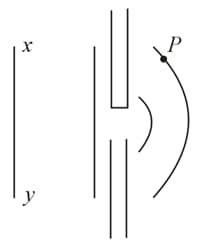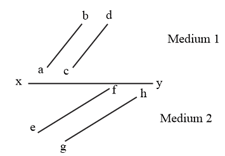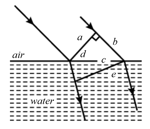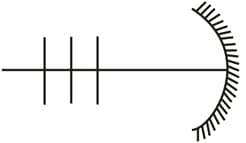Huygens' Wave Theory of Light
Huygens' Wave Theory of Light: Overview
This Topic covers sub-topics such as Wave Optics, Phase of Waves, Spherical Wavefront, Plane Wavefront, Cylindrical Wavefront, Secondary Wavelets, Speed of Light Waves, Huygens Wave Principle, Sources of Light Waves and, Types of Wave Fronts
Important Questions on Huygens' Wave Theory of Light
Assertion: When a plane wave passes through a thin prism, the emerging wavefront gets titled.
Reason: Speed of light is less in glass than in air.
A light beam travelling along the -axis with planar wavefront is incident on a medium of thickness, . In the region, where light is falling the refractive index can be taken to be varying such that . The light beam on the other side of the medium will emerge
Which of the following phenomenon cannot be explained by the Huygens' wave theory?
Ray is the locus of points in the light wave’ having the same phase of oscillation at any instant.
Two sources of monochromatic light are said to be coherent, if light waves produced by them have the same
In Huygen's principle, secondary wavefront at any later time is given by______envelope of secondary wavelets at that time.
After reflection from a concave mirror, a plane wavefront becomes-
The Huygen's wave theory is failed to explain the photoelectric effect because:
The phenomenon of light that can be explained using Huygen's theory of light is/are:
A monochromatic plane wave of speed c and wavelength is diffracted at a small aperture. The diagram illustrates successive wavefronts (vibrating in the same phase). After what time will some portion of the wavefront reach ?

Spherical wavefronts shown in figure, strike a plane mirror. Reflected wavefronts will be as shown in

Light waves travel in vacuum along the -axis. Which of the following may represent the wavefront?
The figure shows a surface separating two transparent media. Medium and medium . The lines and represent wave fronts of a light wave travelling in medium and incident on . The lines and represent wavefronts of the light wave in medium after refraction.
Light travels as a,
Figure shows plane waves refracted from air to water using Huygens' principle and , , , , are lengths on the diagram. The refractive index of water with respect to air is in the ratio

Plane wavefront are incident on a spherical mirror as shown. The reflected wavefront will be

Which of the following phenomena is not explained by Huygens' construction of wavefront?
The concept of propagation of light by means of secondary wavelets of a wave was put forward by,
